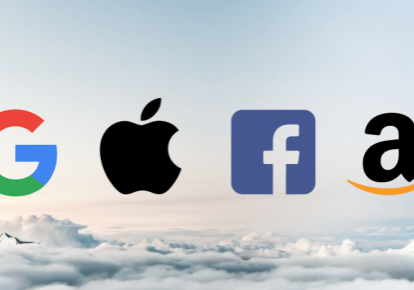
The technology companies that comprise the GAFA (Google, Apple, Facebook, and Amazon) don’t just dominate their own core industries. They’ve entered each other’s playing fields or even invented whole new sectors of business. In many ways, it appears they’re in a competitive race toward world domination. Let’s look at where they started from, where they’re going, and why it matters for e-commerce.
Editor’s Note: Most of the business sectors mentioned for Google here are actually ventures of parent company Alphabet. But the Google branding is still part of what the company sells, so GAFA it will remain.
No barriers to entry for these Giants of the Internet
The barriers between the GAFAs used to be clear, but now the walls are coming down. And competition is heating up in all kinds of sectors as the lines between them get blurred.
These four players are the uncontested leaders in new technologies of all kinds. But they are deploying their latest technologies now in multiple sectors, blurring the differences that once defined them as “computer makers” or “online marketplaces.” They are competing on all fronts.
Each of these GAFA companies sees the others as a potential competitive threat. They are edging their way into industries adjacent to ones where they have already found success, entirely to find opportunities for disruption. This drives their constant quest for innovation – how can they disrupt this or that kind of service delivery to make it more desirable than what the competition is doing?
There are two different kinds of business sector disruption going on as a result of the ever-growing competition between the GAFA. There’s disruption of delivery models for traditional businesses, and application of new technologies for all-new types of business.
Disruptive technologies applied to traditional business models
Here’s a brief list of familiar kinds of businesses whose service delivery models were disrupted by the GAFA, and which of them now have their fingers in those pies.
Consumer Electronics (Smartphones, computers, tablets, peripheral devices, smartwatches and smart home devices.)

Original Player(s) Current Competitors
Apple Apple, Google, Amazon
Health & Wellness (Health tracking and monitoring software, wearable devices, and human disease research.)
Original Player(s) Current Competitors
None Google, Apple, Facebook
Licensed Media Sales (Media like books, music, or video that’s licensed and sold by GAFA companies, but produced by others)
Original Player(s) Current Competitors
Amazon Amazon, Apple, Google
Online Shopping (Online marketplaces or shopping comparison sites for selecting & buying products)
Original Player(s) Current Competitors 
Amazon Amazon, Google, Facebook
Media Content Production (Original movie and TV series productions, streamed to paid subscribers)
Original Player(s) Current Competitors
Amazon’s Audible Amazon Studios, Apple TV
Banking & Payments (Credit cards, personal bank accounts, and payment processing for purchases)
Original Player(s) Current Competitors
Amazon Amazon, Google, Apple, Facebook
In particular, the disruption of traditional banking services has attracted fierce competition among the GAFA. Leveraging their online shopping services like Facebook Marketplace and Google Shopping, they also offer instant checkout features that mimic the original Amazon “Buy Now” feature. It’s all a race to capture and keep consumers’ buyer ID within their own platforms. The expanding range of payment processing options is helping e-commerce businesses see more conversions from customers, with more choices in ways to pay.
Domination of new, technology-driven business sectors
Cloud Storage
Amazon Web Services. This is a big part of Amazon’s business. The company reported that for the 2nd quarter of 2021, its AWS revenues were worth $13.5B, accounting for 12.5% of overall revenue.
Google Cloud – Google’s core infrastructure offers not just cloud storage, but also includes data analytics and machine learning.
Apple’s iCloud is an integral piece of the infrastructure it offers to users within the Apple ecosystem.
Artificial Intelligence
Facebook’s Algorithms. In many ways, Facebook pioneered artificial intelligence back when it was helping users find the hottest girls on campus. Now it can predict whatever you’re hot for.
Amazon’s Echo. Amazon knows exactly what you’re likely to want; it’s been tracking and building algorithms around your preferences for years.
Google AI. Google devotes an entire division to the development of its AI capabilities. Ultimately, AI will enhance nearly every aspect of the Google experience through the Internet of Things.
Apple AI. Apple is the leading buyer of companies in the global artificial intelligence space, according to analytics firm GlobalData. It now permeates nearly every feature on every kind of Apple device.
Self-Driving Vehicles
Google self-driving cars. They’re already here, tooling around the streets in select cities.
Apple self-driving cars. It’s all still very hush-hush, but it’s an open secret that Apple has a division working on self-driving technology for Apple-produced cars.
Amazon delivery drones and self-driving vans. These are all still in development stages, but we’ll be seeing them in the air and on the streets before too long.
Commercial Space Technology
 Amazon’s Blue Horizon. Jeff Bezos’ boyhood dream came true with a joyride to the edge of space in July 2021.
Amazon’s Blue Horizon. Jeff Bezos’ boyhood dream came true with a joyride to the edge of space in July 2021.SpaceX – Google won’t own the stars just yet, but it does have a $900M stake in Elon Musk’s commercial spacecraft venture.
The GAFA may have started with different core businesses but when it comes to disrupting a wide swath of business sectors, they are all heading in the same direction. If stiff competition benefits the consumer, we’re all in for a thrill ride–even if we can’t afford a ticket on Blue Horizon.




